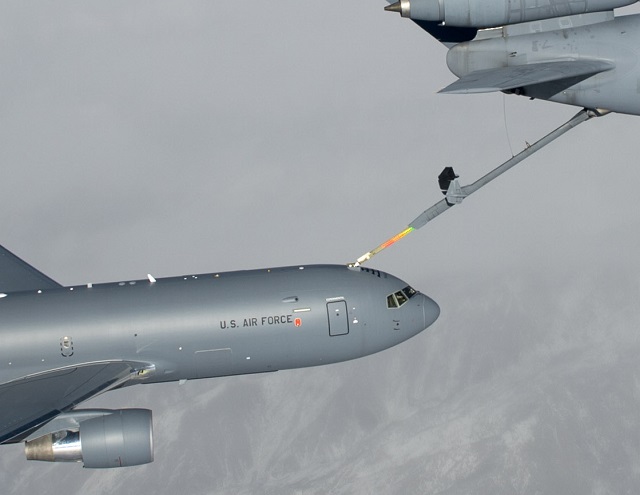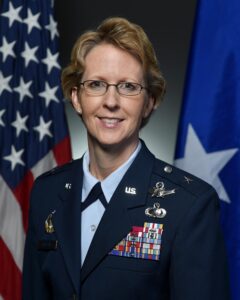
Fuel onload testing from a KC-10 to the KC-46
WASHINGTON: More testing, due next month, is needed before the Air Force knows whether the undetected banging of the KC-46 tanker’s refueling boom is a problem that needs fixing.
Preliminary data indicates the banging (formally known as Undetected Contacts Outside The Receptacle –UCOTR) is happening more frequently than it does in the existing tanker fleet, the tanker Program Executive Officer, Brig. Gen. Donna Shipton, told reporters today: “We do think it, potentially, is occurring at a higher rate.”

Brig. Gen. Donna Sharpton
If the problem occurs more frequently, then the Air Force needs to determine whether the aircraft and boom meet contract specifications. If they do, then the Air Force would have to pay for any required modifications. If not, Boeing ponies up. “That’s going to depend on the outcome of the testing,” she said.
The Air Force remains convinced that the difficulties with FAA certification will lead to aircraft delivery in spring, while Boeing insists it will be a Christmas present.
This is one of three Category One deficiencies identified, none of which they think should affect what the Air Force calls “the critical path for aircraft delivery” and delay the expected spring 2018 arrival of the tankers to Air Mobility Command.
Here are detailed description of the three problems provided today in an Air Force statement.
High Frequency Transmit Inhibit During Aerial Refueling Non-Compliance: HF radios must not transmit during air refueling. There is currently insufficient test data to verify that when radios are commanded off, they remain off, even after various failure modes. The Air Force is conducting qualification data review and Boeing is planning failure modes and effects testing in October. Assuming positive results, the Air Force expects to close the deficiency report.

A KC-46 refuels an A-10
Uncommanded Boom Extension During Flowing Disconnect: Uncommanded boom extensions have occurred during ground tests when performing boom disconnects while fuel is flowing through the air refueling boom. The Air Force is performing data analysis of the test results and will make a decision on the DR in October.
Undetected Contacts Outside Receptacle (UCOTR): Boom contacts outside the receptacle are not being detected by the boom operator. Detection of COTR is required to determine if contact caused damage and to comply with standard air refueling procedures. The Air Force is reviewing historical USAF aerial refueling certification flight test data to determine the frequency of COTR in current operations. The Air Force is planning to begin air refueling testing with the KC-46 starting in October and will carefully test for UCOTR occurrences. Final determination of specification compliance will occur after flight testing is complete.
Schedule Risk Assessment: The HF and UCOTR technical issues have been known since the completion of Boeing’s development air refueling tests, in late 2016 and early 2017, respectively. The uncommanded boom extension deficiency was discovered during a ground test this May. This year’s schedule risk assessment included a risk of late discovery of technical issues that would impact FAA certifications or delivery, but not any particular DR. These three DRs are not considered on the critical path for aircraft delivery.
In a ‘world first,’ DARPA project demonstrates AI dogfighting in real jet
“The potential for machine learning in aviation, whether military or civil, is enormous,” said Air Force Col. James Valpiani. “And these fundamental questions of how do we do it, how do we do it safely, how do we train them, are the questions that we are trying to get after.”


























